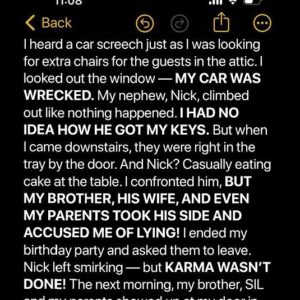I never thought feeding my granddaughter would land me in the newspaper. But that rainy afternoon, everything changed.
Sarah, my miracle girl, was born when I was already 40. She was the center of my world until last year when childbirth took her from me before she could even hold her daughter. Baby Amy. Just the two of us now. Her father sends the occasional check, but responsibility was too heavy for him—so it’s my arms that rock her through the night, my weary hands that change diapers at 72.
That morning had already been a trial. The pediatrician’s office was crowded and Amy cried through the entire checkup. By the time I stepped outside, my back screamed with pain and the sky poured down sheets of cold rain. Desperate, I spotted a café across the street. Warmth. Shelter. A chance to feed Amy before we both broke down.
Inside, the smell of coffee and cinnamon rolls wrapped around me. I tucked her stroller by my side and reached for her bottle. She was fussing, poor thing, tiny cries echoing too loud in my ears. I rocked her gently, whispering, “Shh, sweetheart. Grandma’s here.”
That’s when I heard it—the hiss of disapproval. A young woman at the next table wrinkled her nose.
“Ugh. This isn’t a daycare. Some of us came here to relax.”
Her companion leaned forward, voice sharp enough to cut glass.
“Why don’t you take your crying baby and leave? Some of us pay good money not to hear that.”
Heat rose to my cheeks. I wanted to vanish into the rain again, but Amy needed me. “I just needed somewhere to feed her,” I said softly.
The woman rolled her eyes. “Feed her in your car. Don’t ruin everyone else’s peace.”
My hands shook so badly I almost dropped the bottle. Then, as if humiliation wasn’t enough, the waitress appeared, tray clutched like a shield. “Ma’am… maybe it’s best if you stepped outside until she settles down?”
I swallowed hard. “I will order something,” I whispered. “I just need a moment.”
But before I could calm Amy, the door opened. Two police officers stepped in, rain dripping from their uniforms. My stomach lurched.
The older one spoke firmly, “Ma’am, we were told you’re disturbing the customers. Is that true?”
“Someone called the police? On me?” My voice cracked.
The younger officer explained, “The manager waved us over. Said there was a problem.”
I stammered, “I wasn’t trying to cause trouble. I only wanted to feed my granddaughter.”
The older officer’s gaze softened. “So the disturbance… was a hungry baby?”
When Amy whimpered again, the young officer held out his arms. “My sister’s got three kids. I’m a wizard with babies. May I?”
With trembling hands, I let him take her. Within seconds, she was drinking peacefully, nestled against his uniform.
“See?” the older officer said dryly. “Disturbance solved.”
The manager tried sputtering about “café culture” and “non-paying customers,” but the officer ordered pie and coffee for all three of us on the spot. I nearly wept with relief. For the first time that day, I felt seen.
We ate together at that table—me, Amy, and two kind officers named Christopher and Alexander. I told them a little about Sarah. They listened, really listened, without judgment. When it was time to leave, they insisted on paying the bill.
Before walking out, Alexander asked, “Can I take a photo? For the report.” I smiled beside Amy’s stroller, thinking it was just a formality.
I never imagined that photo would appear in the local paper days later. Turns out, Alexander’s sister was a reporter. She wrote about “the grandmother nearly thrown out of a café for feeding her baby.” My phone rang nonstop with people telling me I was front-page news.
The café fired its manager. A new sign now hangs on the door: Babies Welcome. No Purchase Necessary. When I visited again, the same waitress greeted me with a genuine smile. “Anything you want is on the house.”
That day in the rain, I thought the world had forgotten kindness. But strangers reminded me it still exists—and that sometimes, the loudest cries can bring unexpected change.





